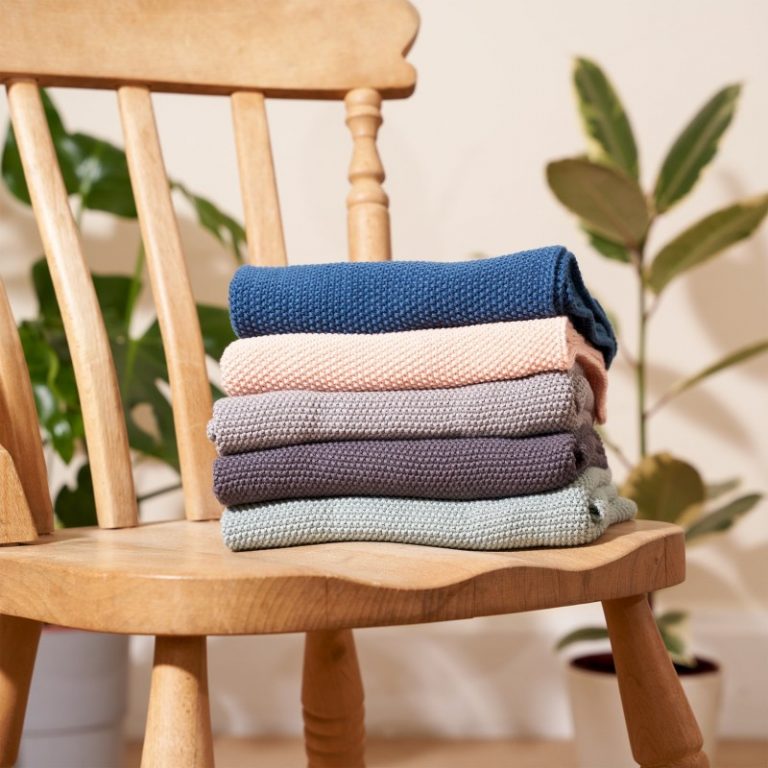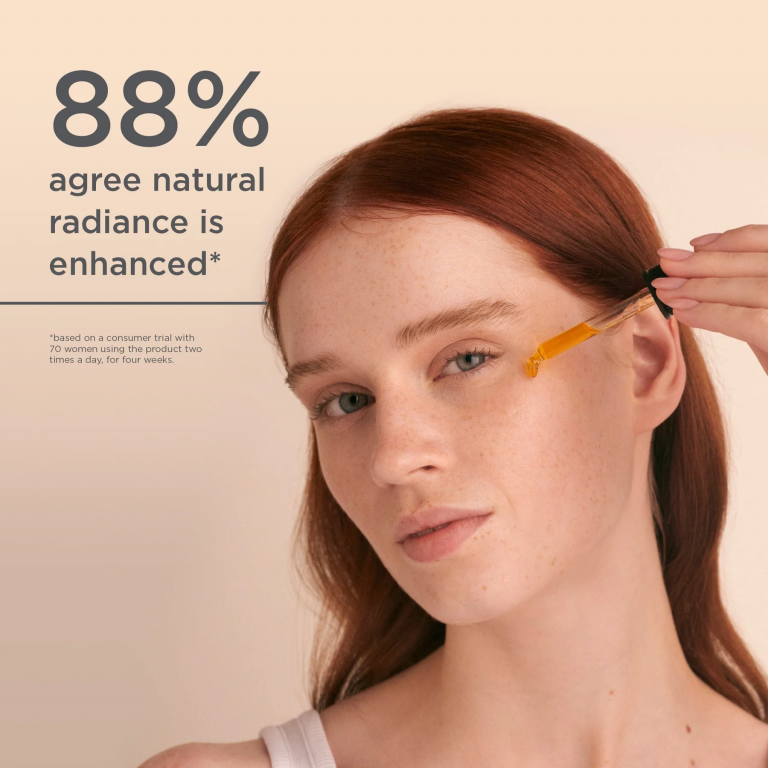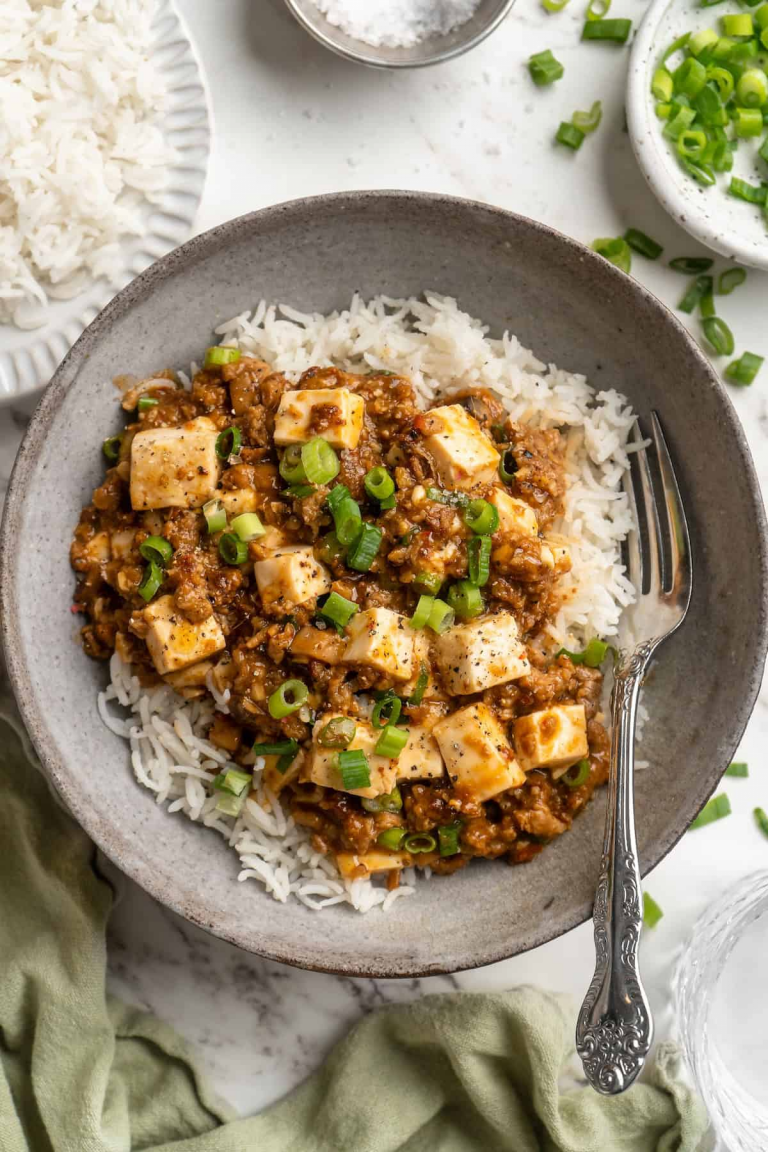
Handmade vegan soaps have found their way into more English bathrooms than ever before. A surge in eco-awareness and a growing number of plant-based lifestyles are changing the way we look at what goes into our favourite bar of soap.
Even today, most shelve are lined with palm-oil-based soaps (sodium palmate) or ones filled with animal fats (like sodium tallowate). Both ingredients trigger concern among eco-friendly shoppers.
Choose unscented soaps for pregnancy/nursing and babies. Avoid shea butter for latex allergies.
Don’t use ‘human’ soap on pets (a different PH and unsafe ingredients like cocoa butter and macadamia/citrus oils – wash off before letting pets kiss you!) Read more on giving dogs baths.
Palm oil production contributes to massive deforestation and loss of endangered wildlife habitats. Animal fats pose issues for those wanting clean, plant-based routines. A new wave of brands now offers alternatives free from palm oil and animal products, putting skin health and planet first.
Why Choose Palm Oil-Free Vegan Soaps?
Palm oil is cheap and common, but the true cost goes much deeper. Mighty rainforests fall to make way for plantations. Orangutans, tigers and other threatened animals lose their homes. Local communities face social upheaval and loss of traditional lands.
Opting for palm oil-free vegan soaps turns your daily wash into a quiet act of defiance against these problems.
Plant-based soaps skip animal-derived ingredients like tallow, making them kinder to animals and often gentler on the skin. They use butters and oils from olives, coconut, shea or sunflower that cleanse and nourish without harm. These ethically made alternatives biodegrade easily, add no pollutants and support a cleaner water cycle.
Sodium Palmate and Sodium Tallowate
Most mainstream soaps list sodium palmate or sodium tallowate among the first ingredients. Sodium palmate comes from palm oil, while sodium tallowate is made by rendering animal fat. These are cheap, produce hard bars and plenty of lather, but they come at a price to the planet and animal welfare.
Palm oil-based soaps help drive deforestation in Indonesia and Malaysia, which together supply over 85% of the world’s palm oil. Packing bars with sodium tallowate brings the beef and dairy industry into your bathroom – fuelling further demand for factory farming and associated issues.
True vegan or eco-friendly soaps leave both of these out on purpose, choosing kinder ingredients instead.
Environmental and Ethical Advantages
Palm oil production is the leading cause of rainforest loss in Southeast Asia. The World Wide Fund for Nature reports that every hour, rainforests equal in size to 300 football fields vanish in the tropics, mostly for palm plantations.
This destruction wipes out habitat for tigers, elephants and orangutans, putting them at risk of extinction. Slavery, child labour and social upheaval are also reported in the palm industry.
Choosing vegan, palm oil-free soaps helps protect these forests and the species that rely on them. According to the Rainforest Foundation UK, switching to alternatives reduces your household’s carbon footprint and water pollution. By skipping animal products, these soaps avoid cruelty and offer a path to a more ethical, plant-based routine.
What Makes a High-Quality Soap?
When looking for a quality handmade vegan soap, transparency is key. Reputable brands proudly list every ingredient – no mystery chemicals or confusing jargon. They use nourishing plant oils, rich butters, and beneficial clays or botanicals. These soaps lather well and rinse clean, leaving skin soft rather than tight or dry.
Signs of great handmade vegan soap:
- Full ingredient transparency
- No palm oil or animal fats
- Sustainable, minimal packaging
- Natural, plant-based scents
- Gentle, skin-loving formulas
- Plastic-free or zero waste focus
Great soaps use cold-pressed oils and essential oils for scent. Look for bars that feel smooth and firm, not crumbly or sticky. Sustainable practices often extend to water-saving, low-waste production methods.
Zero Waste Packaging and Sustainable Choices
Handmade vegan soap businesses often go further than just the bar, choosing packaging that leaves minimal trace. Cardboard boxes, paper wraps or compostable sleeves outshine plastic wrappers.
Some brands reuse post-consumer materials or offer naked bars if you prefer no packaging. Shipping practices include recycled materials or even a return scheme for empty tins and jars.
Plastic waste swamps our oceans and landscapes. By buying from brands with a zero waste or low waste pledge, you help slow the tide.
Natural Scents vs. Artificial Fragrances
Synthetic scents may seem inviting at first sniff, but many trigger allergies or sensitivities. Parfum or ‘fragrance’ on an ingredients list often hides dozens of undisclosed chemicals. Natural soap makers choose essential oils from lavender, mint, citrus or woods, giving bars subtle, complex scents that won’t overpower.
Natural scents provide aromatherapy benefits as well. Lavender calms, peppermint energises, and citrus uplifts. Essential oil blends reduce the risk of skin irritation for those with sensitive skin. Many people find their allergies improve when they switch to a plant-based bar with only real botanicals for fragrance.
Palm Oil-Free Handmade Vegan Soaps
Not every “natural” soap is palm oil-free. These UK-based brands lead the way with transparent ingredients and clear eco ethics.
Alter/native by SUMA
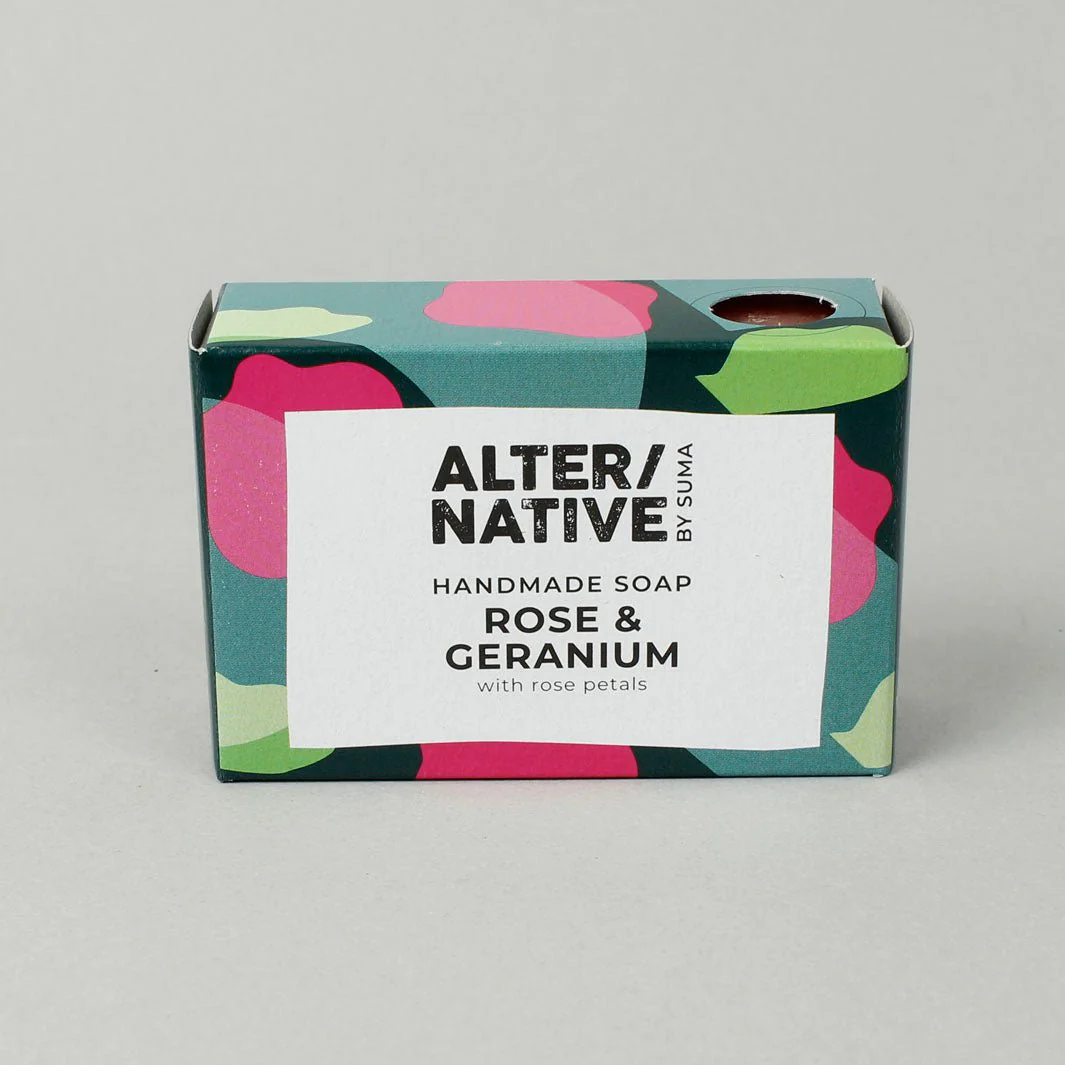
Alter/native by Suma Soap Bars are made with natural ingredients, then packed in recycled paper. Containing olive and coconut oils, with shea butter and essential oils.
Many liquid and bar soaps strip skin of natural oils or cause irritation. Alter/native by SUMA soaps gently cleanse and leave a soft, comfortable feeling. The rich blend of coconut oil, olive oil and shea butter helps soothe dryness and works well for most skin types, even if you’re sensitive.
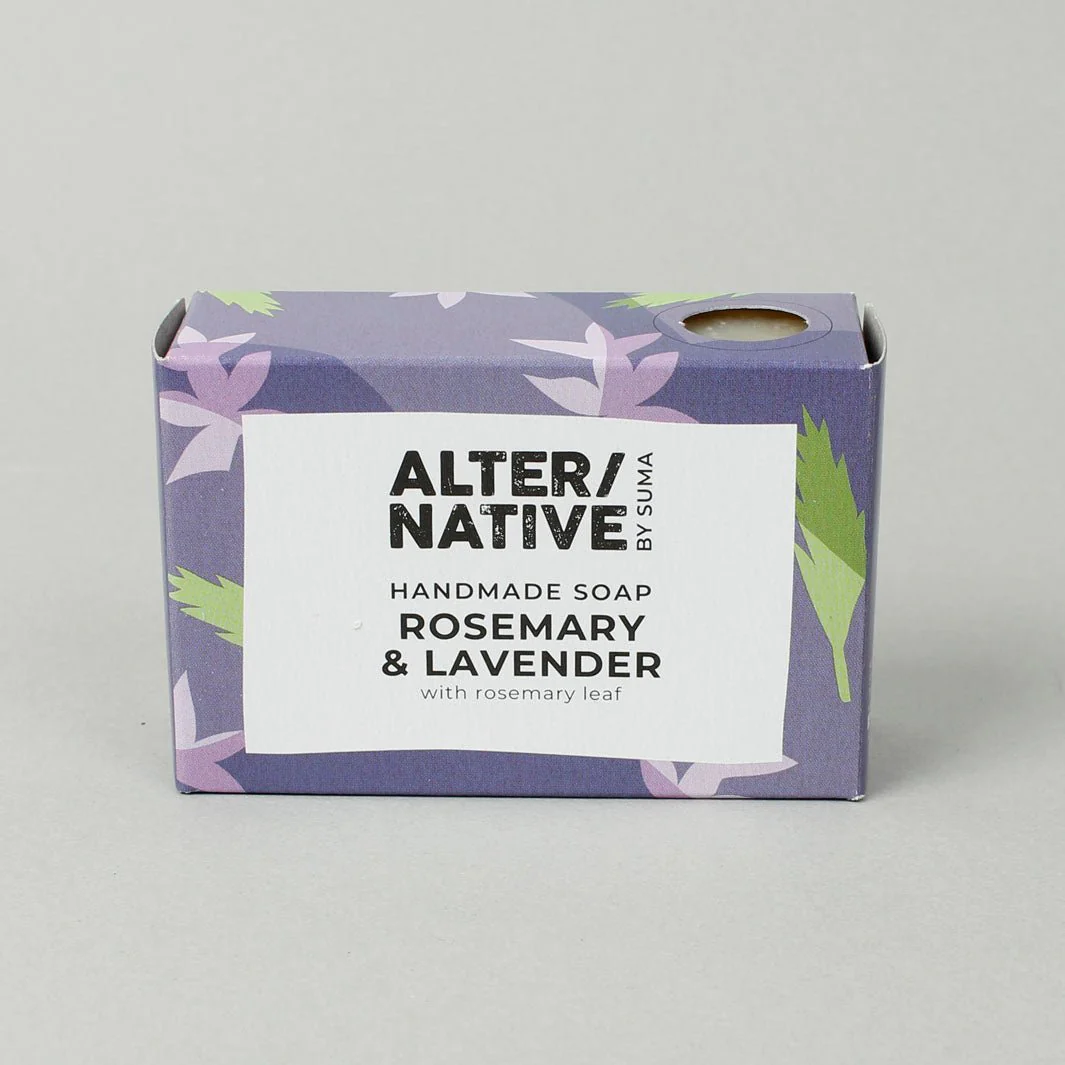
SUMA is run by its workers as a co-operative. That means your money supports fair pay, strong working conditions and a business owned by its staff.
Coraline Soaps (for very dry and sensitive skin)
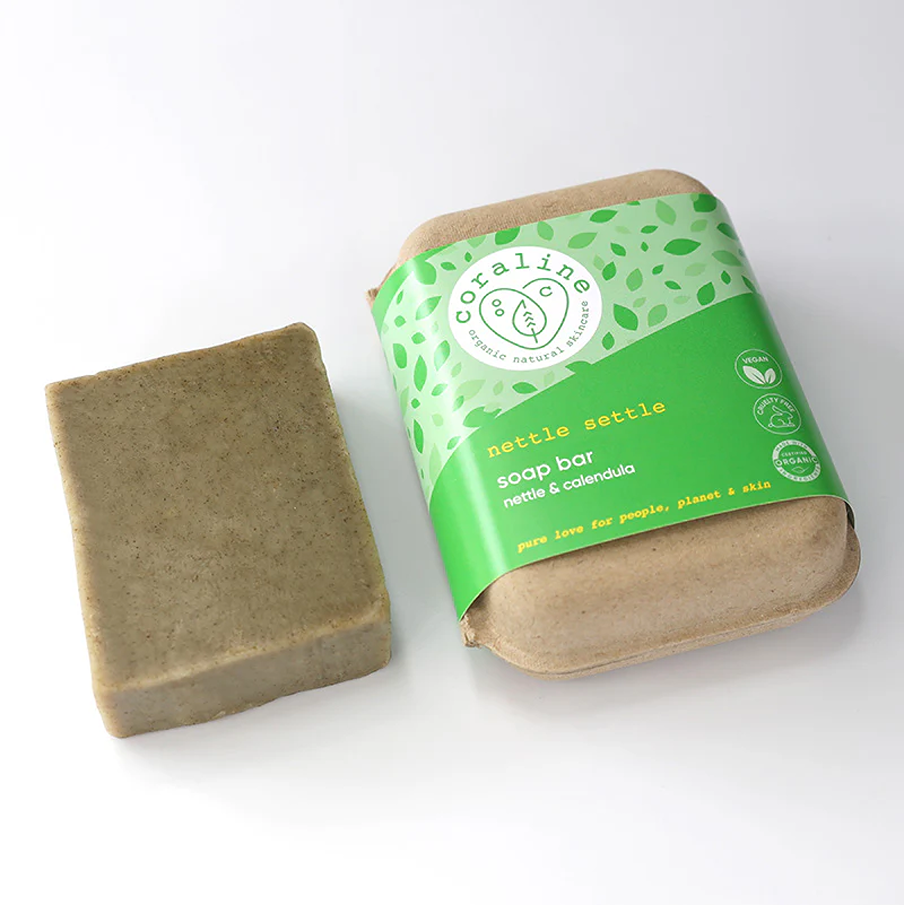
Coraline Soaps (also sold at Blomma Beauty (use code englandnaturally for 10% discount) was created by the parents of a baby with Down Syndrome, who could not tolerate ‘sensitive skin’ soaps. The chamomile soap has anti-inflammatory ingredients to relieve dry itchy skin.
For 3 months and up only. Check for nut allergies.
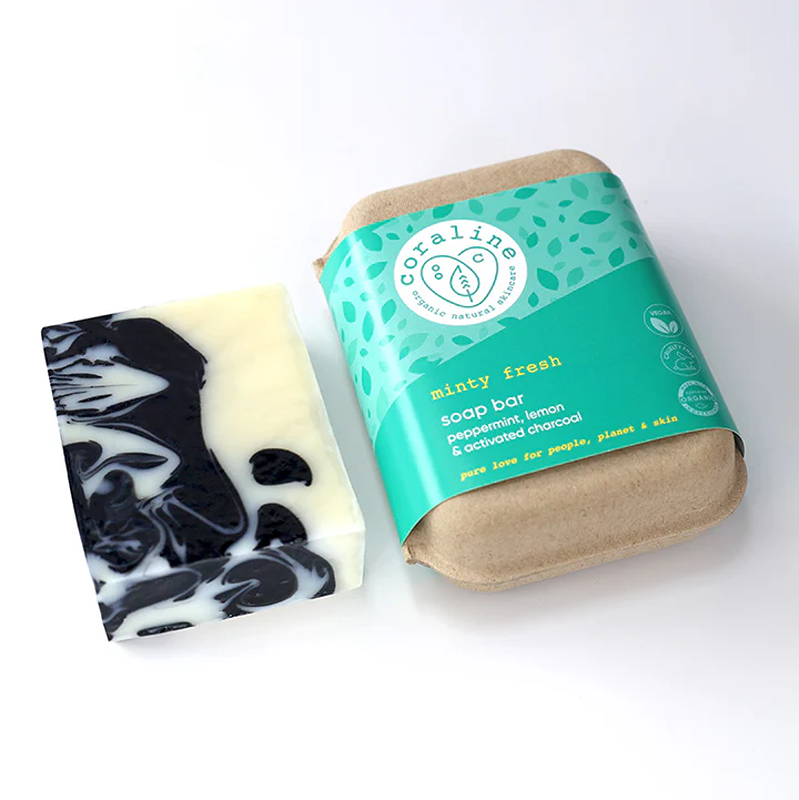
Skin experts often recommend Coraline Soaps for people with sensitive skin. Their formulas are tested to make sure they’re safe and kind.
Coraline Soaps don’t just clean, they hydrate too. The blend of nourishing oils leaves skin feeling soft and never stripped. For people who get tight, dry skin after washing, this extra moisture can make daily washing feel soothing and gentle.
Coraline Skincare has a page on how to help people with eczema and similar skin conditions.


Helleo Olive Oil Soaps (great for sensitive skin)

This handmade strawberry mint soap is made with hand-picked strawberries and freshly-harvested peppermint.
Olive oil soap is famous for being soft on sensitive skin. The natural fats in olive oil keep moisture in and harsh additives out. This means fewer worries about rashes or irritation. Paper packaging also keeps extra chemicals away, so you get a pure bar each time.
Olive oil is good for sensitive skin. One woman went to a dermatologist for her ‘incurable itchy skin’ even though she was using the brand leading soap.
After he couldn’t help, she popped to Holland & Barratt and bought a cheap plain bar of Oliva soap (just olive oil, salt and water). And her skin began to heal in an hour.
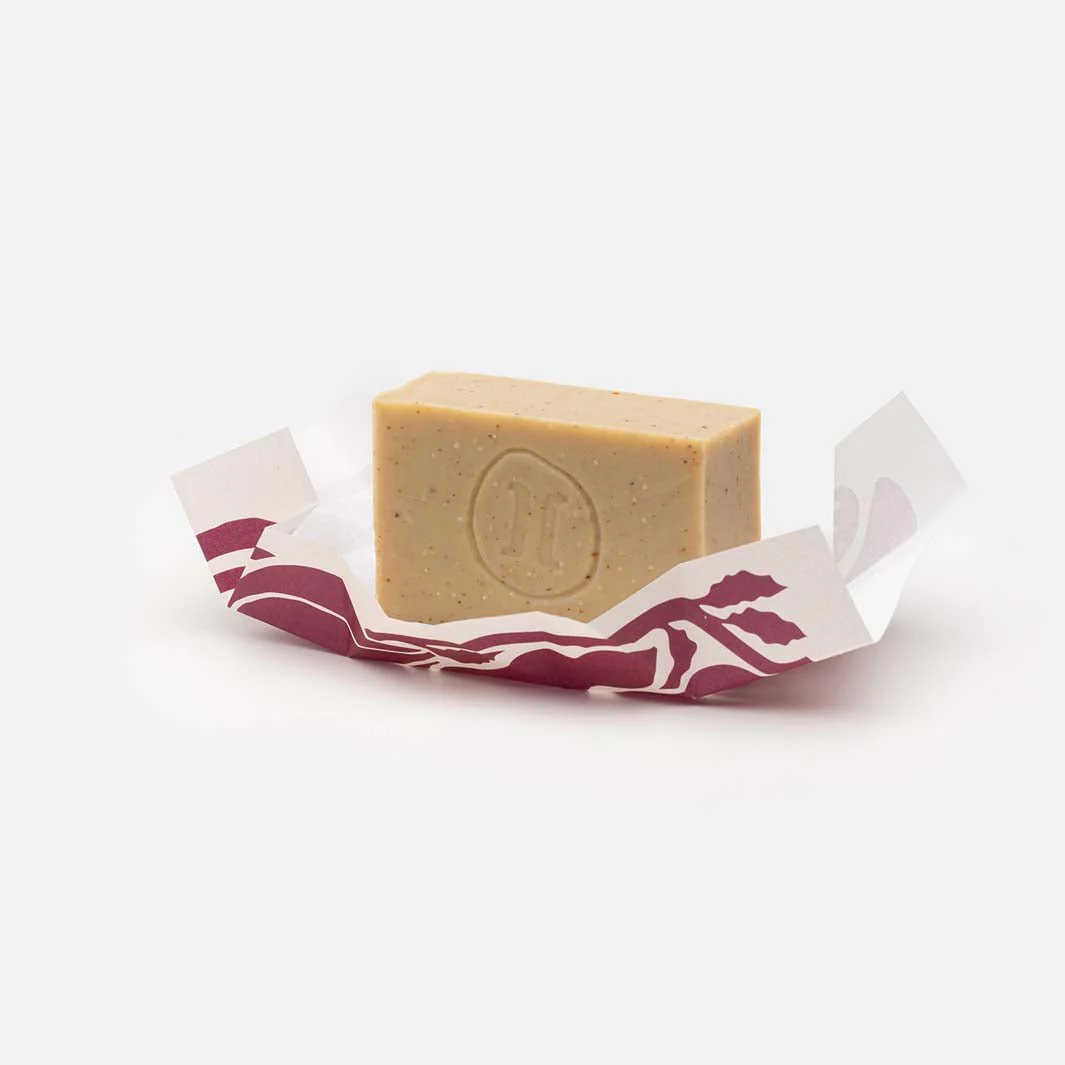
The carob fig soap is made with fig juice and carob syrup. Many olive oil soaps in paper come from small family businesses or independent makers. Buying these bars often means supporting traditional skills and local jobs. You get a quality product and help communities grow.
Hiltwood Soaps (especially for men!)
Hiltwood Turmeric Soap Bar is a unique soap, that is not just vegan and free from palm oil, but specially designed for men. Made with olive and coconut oils, shea butter and natural essential oils, turmeric is ideal for stripping unwanted oil and inflammation from the skin, while cedarwood oil gives a masculine fragrance. Ideal for spotty or red skin, it also contains thyme essential oil.
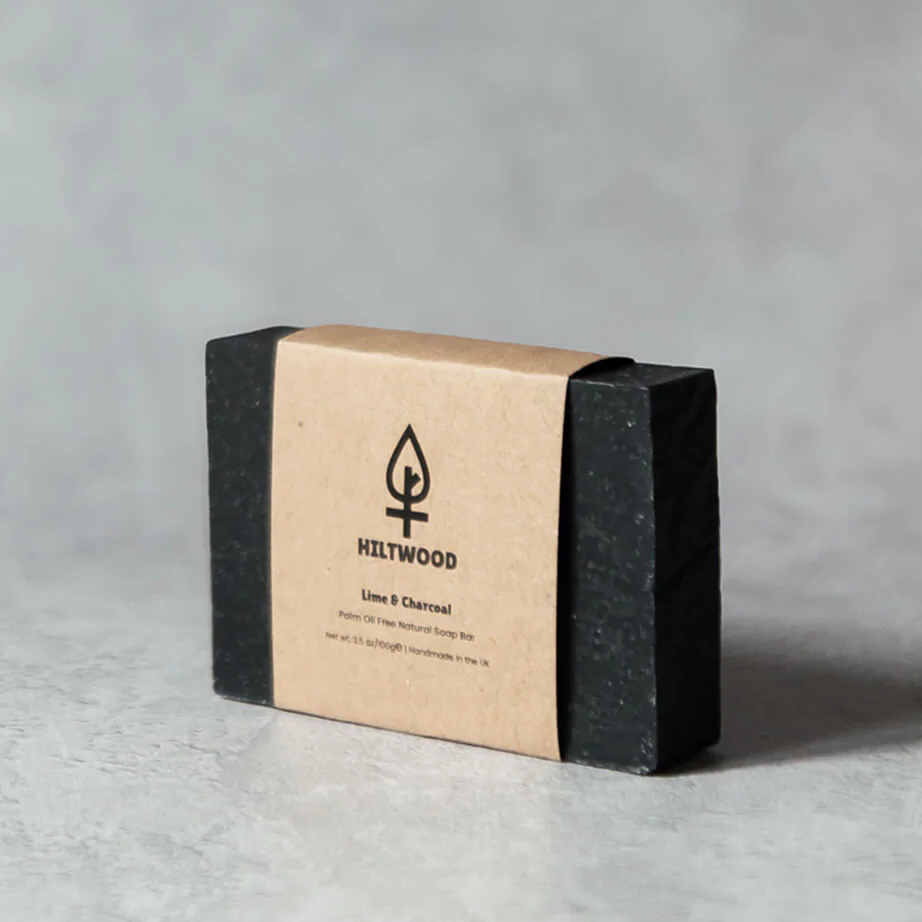
If your skin is very sensitive, you may prefer the same company’s lime and charcoal bar. The kaolin clay and activated charcoal can remove impurities, while refreshing lime oil is blended with healing olive oil.
Slatted Soap Dishes: Prolonging Soap Life
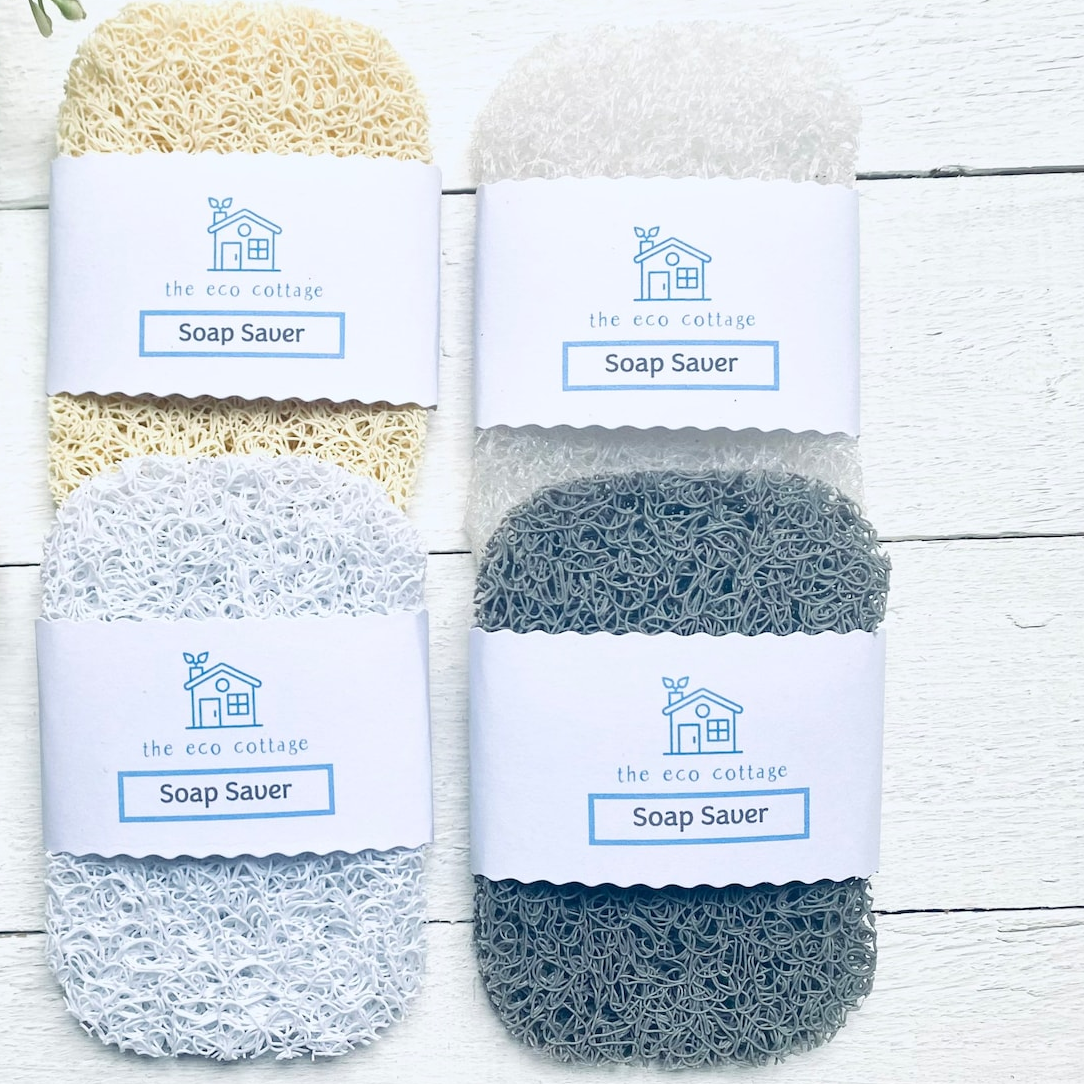
One quick tip that saves money and plastic – keep your handmade soap on a wooden or bamboo slatted dish. Handmade vegan bars often contain extra plant oils for moisture, so they can dissolve faster if left sitting in water.
This soap saver pad only costs a few pounds. In four colours, they can be cut to size. They let air circulate, and if they get clogged with soap, you can just give them a wash (even pop them in the dishwasher) to use again.

A soap dish with good drainage lifts your soap bar out of standing water. Wood, bamboo and slotted plastic trays work well. Gaps let water run off, keeping the base of your soap dry. Without puddles, the bar stays firm and lasts much longer.
Or use a slatted soap dish to drain water away, so your soap lasts longer.
Water wears down handmade soap fast. Place your soap dish on the edge of the sink or away from direct spray in the shower. This stops constant water flow from soaking the bar. Your soap will harden between uses and stay ready for your next wash.

This upcycled coconut husk soap rest is also good to store handmade soap. The large rest can store two bars side-by-side. Due to natural fibres, some minor shedding may occur when you first use them.
Big bars of handmade soap can turn squidgy in the middle. Slice a larger block into halves or quarters. Use one small piece at a time and store the rest in a cool, dry place. Smaller pieces dry out more easily and you’ll always have a backup.

Leaving soap in pools of water or on the side of the bath makes it soft and slimy. Remember to return it to a dry dish after each wash. Even a few minutes in water can start to break the soap down.
Water wears down handmade soap fast. Place your soap dish on the edge of the sink or away from direct spray in the shower. This stops constant water flow from soaking the bar. Your soap will harden between uses and stay ready for your next wash.
Suma’s travel soap tin is ideal for when you’re on the go.
Higher fat content (superfatting) in handmade soap makes it softer. If you have a choice, go for formulas with a lower superfat percentage (like bars made with coconut oil). These bars are firmer and less likely to turn mushy.
Build-up in your soap dish traps water and soap residue. Give dishes a quick rinse and dry at least once a week. Clean dishes mean better drainage and less soggy soap.
Benefits of slatted soap dishes:
- Extend soap bar lifespan by weeks or even months
- Keep soap dry and slip-free
- Cut down on soap scum and bathroom mess
- Simple addition to any zero waste routine
Conclusion
Switching to handmade vegan soaps free from palm oil isn’t just about soft skin—it’s a quiet but powerful way to support forests, wildlife and fair labour. Skipping sodium palmate and tallowate means your daily shower supports clean living, not destruction.
Small swaps like choosing natural scents, compostable packaging and a simple wooden soap dish bring ethical, plant-based care to your routine.
Next time you shop, check your label and pick a soap bar that cares for both you and the planet. Small habits add up to real change—one bar at a time.

